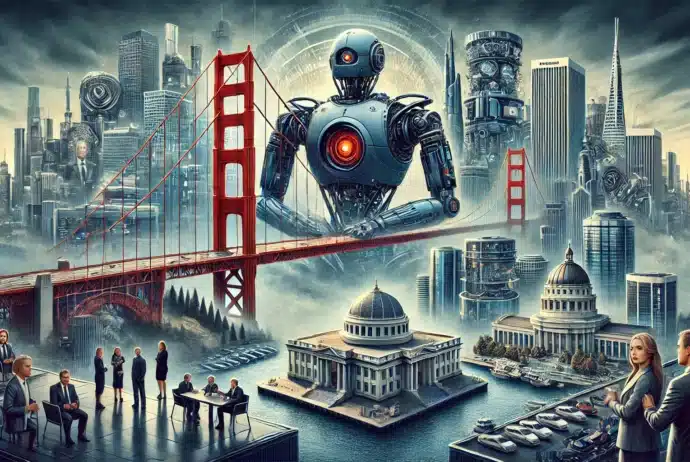Key Insights:
- California’s AI ‘killswitch’ bill could set a national precedent, impacting innovation and talent retention in the tech industry.
- Industry leaders are split on California’s AI regulation, with concerns about stifling growth versus ensuring safety.
- Decentralized AI advocates propose a DAO-controlled killswitch, sparking debate on how to balance safety with democratic oversight.
The California Senate has passed legislation that mandates AI companies implement an “emergency stop” function within their models, stirring debate within the technology sector. The Safe and Secure Innovation for Frontier Artificial Intelligence Models Act (SB 1047) was approved by a vote of 29-9 on August 28, 2024. The bill now awaits the signature of Governor Gavin Newsom.
The legislation introduces stringent safety protocols for AI development in California, including requiring a killswitch mechanism that would allow for the immediate shutdown of AI systems in emergencies. While some industry leaders support the measure due to concerns over potential risks, others criticize it as an overly hasty response that could stifle innovation.
Divergent Views Among Industry Leaders
The passage of SB 1047 has split opinion among prominent figures in the AI industry. Elon Musk, CEO of Tesla and SpaceX, voiced support for the bill, describing it as a “tough call” but necessary given the potential dangers AI could pose. Musk has long been an advocate for cautious AI development and has previously warned about the risks of artificial intelligence.

CypherMindHQ.com Artificial Intelligence Crypto Trading System - Surpass the competition with this cutting-edge AI system! Utilize the prowess of innovative algorithms and amplify your crypto trading strategies with CypherMindHQ. Learn more today!
Conversely, Jason Kwon, Chief Strategy Officer at OpenAI, has been vocal in his opposition. Kwon argues that regulation of this nature should be handled at the federal level rather than through a patchwork of state laws, expressing concerns that California’s legislation could set a precedent that other states might follow, leading to inconsistent regulations across the country.
Concerns Over Talent Drain and Innovation
The fast-moving nature of the AI industry has led some to fear that strict regulations like SB 1047 could drive talent and investment out of California, and possibly the United States. Calanthia Mei, co-founder of the decentralized AI network Masa, criticized the bill, suggesting it might limit the potential growth of the AI industry. Mei noted that “Premature regulations like this will not only drive talent out of California; it will drive talent out of America,” emphasizing the risks of imposing limits on high-potential technologies.
Mei’s concerns echo those of many in the tech industry who believe that rapid AI innovation should be encouraged rather than constrained. They argue that the legislation could have a chilling effect, similar to what has been observed in the cryptocurrency industry, where regulatory uncertainty has led to an exodus of talent and companies from the United States.
Support for Decentralized Solutions
While some oppose the bill, others see it as an opportunity to promote decentralized approaches to AI governance. Raheel Govindji, CEO of the decentralized AI project DecideAI, expressed support for the legislation but proposed a different method for implementing the killswitch. Govindji suggested that a decentralized autonomous organization (DAO) could control the killswitch, allowing for collective and transparent decision-making. He stated, “We are in favor of legislation,” but emphasized the need for a democratic process in enacting emergency stops for AI systems.
Govindji’s proposal aligns with the broader movement towards decentralization in the tech industry, where power and control are distributed among a community rather than centralized in a single entity. However, it remains to be seen whether a DAO-controlled killswitch would meet the promptness requirements set out in the legislation.
Compliance Challenges and Potential Outcomes
SB 1047 specifies that the killswitch requirement will apply to “covered models,” which are defined as AI systems that cost over $100 million to develop or that are trained using significant computing power. The bill has been adjusted to reduce the severity of penalties for non-compliance, shifting from criminal to civil penalties after consultation with industry stakeholders.
However, the legislation has left some ambiguity in key areas. For example, the bill does not clearly define what constitutes a “prompt” shutdown, leaving this open to interpretation and potentially leading to challenges in enforcement.
Some industry experts warn that the legislation could have broader consequences beyond California. Given the state’s prominence in the tech sector, SB 1047 might effectively become a de facto national standard, influencing AI development practices across the country. Companies that wish to avoid these regulations may need to consider relocating their operations, though doing so would require ceasing all services in California.

CypherMindHQ.com Artificial Intelligence Crypto Trading System - Outpace the competition with this high-end AI system! Leverage the capabilities of progressive algorithms and enhance your crypto trading performance with CypherMindHQ. Learn more today!



